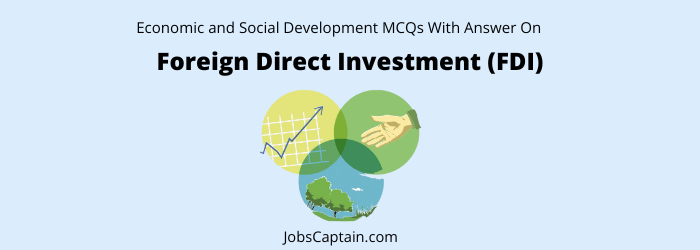
Think you know everything there is to know about foreign direct investment (FDI)? Take our quiz to find out!
This quiz tests your knowledge of foreign direct investment (FDI) and its benefits. See how much you know about FDI and its impact on the economy!
| Return To | Economic and Social Development MCQ | |
Question 1: Which sector in India attracts the highest FDI equity flow?
(A) Construction sector
(B) Energy sector
(C) Service sector
(D) Automobile sector
Question 2: The maximum limit of Foreign Direct Investment (FDI) in public sector banking is __________.
(A) 20%
(B) 50%
(C) 33%
(D) 49%
Question 3: Which of the following pairs are correctly matched?
- Increase in foreign exchange reserves – Monetary expansion
- Low import growth – Recession in Indian industry
- Euro issues – Shares held by Indian companies in European countries
- Portfolio investment – Foreign institutional investors
Select the correct answer from the codes given below.
(A) 1, 2 and 4
(B) 3 and 4
(C) 1, 2 and 3
(D) 1, 2, 3 and 4
Question 4: Which of the following would include Foreign Direct Investment in India?
- Subsidiaries of companies in India.
- Majority foreign equity holding in Indian companies.
- Companies exclusively financed by foreign companies.
- Portfolio investment.
Select the correct answer using the codes given below.
(A) 1, 2, 3 and 4
(B) 2 and 4
(C) 1 and 3
(D) 1, 2 and 3
Question 5: A great deal of Foreign Direct Investment (FDI) to India comes from Mauritius than from many major and mature economics like UK and France why?
(A) India has preference for certain countries as regards receiving FDI
(B) India has double taxation avoidance agreement with Mauritius
(C)Most citizens of Mauritius have ethnic identity with India and so they feel secure to invest in India
(D) Impending dangers of global climatic change prompt Mauritius to make huge investment in India
Question 6: In the context of governance, consider the following.
- Encouraging Foreign Direct Investment inflows.
- Privatisation of higher education institutions.
- Down-sizing of bureaucracy
- Selling/Offloading the shares of Public Sector undertaking
Which of the above can be used as measures to control the fiscal deficit in India?
(A) 1, 2 and 3
(B) 2, 3 and 4
(C) 1, 2 and 4
(D) 3 and 4
Question 7: Both Foreign Direct Investment (FDI) and Foreign Institutional Investor (FII) are related to investment in a country. Which one of the following statements best represents an important difference between the two?
(A) FII helps brings better management skills and technology, while FDI only brings in capital
(B) FII helps in increasing capital availability in general, while FDI only targets specific sector
(C) FDI flows only into the secondary market, while FII targets primary markets
(D) FII is considered to be more stable than FDI
Question 8: In terms of the share in Foreign Direct Investment Equity inflows, in India during 2016-17, which of the following countries is on the top?
(A) Mauritius
(B) Singapore
(C) Japan
(D) U.S.A.
| Return To | Economic and Social Development MCQ | |
